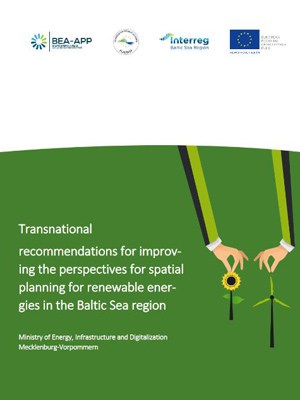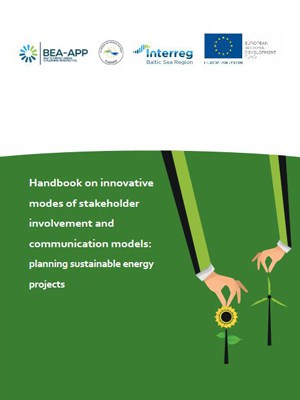BEA-APP
Planning processes for renewable energy projects are too slow
More renewable energy installations need to be erected faster to meet the ambitious climate mitigation and renewable energy targets in the EU and the Baltic Sea region's countries. Spatial planners play a crucial role in erecting renewable energy installations, as they are the ones to find and designate suitable locations, based on criteria defined in their respective laws and regulations and taking into account the needs and interests of other users, of local people and of the environment.
However, spatial planners often lack the appropriate planning instruments to define and designate the best suitable areas. They are faced with local resistance and a “not in my backyard“ attitude towards renewable energy projects. And they do not always have enough knowledge on local resources and circumstances to find smart place based solutions. Thus, spatial planners face numerous challenges which prolong planning processes for renewable energy projects and slow down Europe's transition to a low carbon economy.
Budgets
in numbers
-
2.69MillionTotal
-
2.11MillionErdf
-
0.00MillionEni + Russia
-
0.00MillionNorway
Achievements
Merging two perspectives and testing on the ground
Within the BEA-APP project, spatial planners and regional energy planners collaborated and exchanged their different perspectives on renewable energy development. Together they elaborated a set of spatial planning criteria which reflect the challenges related to renewable energy production better than the existing criteria applied in planning and approval of windfarms, biogas plants, solar parks as well as energy storage systems. In order to increase the social acceptance of renewable energy projects, innovative stakeholder involvement methods and financing instruments were developed and tested by the project partners. The test cases included geoenergy in Äänekoski city (Finland), biogas in Odsherred (Denmark), and solar energy in Lund (Sweden).
Regions become better at renewable energy planning
The newly defined spatial planning criteria served to evaluate and improve the existing renewable energy strategies of nine regions, including Blekinge and Skåne (Sweden), Mecklenburg-Vorpommern (Germany), Tartu (Estonia), Western Pomerania (Poland), and Zemgale (Latvia).
Outputs
Transnational recommendations to improve spatial planning processes for renewable energy projects

Planning sustainable energy projects: Handbook on innovative stakeholder involvement and communication models

Project Stories
-
20.12.2016
Conflict resolution in spatial planning enables wind farm development in europe
On 8 May Germany hit a record high number of 87,6 % of national electricity generated from renewable resources. Even though Germany and other countries around the Baltic Sea are doing well in renewable energy production, there is still a lot left to do in terms of installing renewable energy facilities In order to meet the EU energy goals by 2030.Read full story
Partners
Ministry of Energy, Infrastructure and Digitalization Mecklenburg-Vorpommern
- TownSchwerin
- RegionSchwerin, Kreisfreie Stadt
- CountryGermany
- RepresentativeGabriele Hoffmann
- Phone
- E-Mail
- Web
Skåne Association of Local Authorities
- TownLund
- RegionSkåne län
- CountrySweden
- RepresentativeWik Per-Johan
- Phone
- E-Mail
- Web
Region Blekinge
- TownKarlskrona
- RegionBlekinge län
- CountrySweden
- RepresentativeJenny Rydquist
- Phone
- E-Mail
- Web
Energy Agency for Southeast Sweden
- TownVäxjö
- RegionKronobergs län
- CountrySweden
- RepresentativeSarah Nilsson
- Phone
- E-Mail
- Web
Regional Council of Central Finland
- TownJyväskylä
- RegionKeski-Suomi
- CountryFinland
- RepresentativeHanna Kunttu
- Phone
- E-Mail
- Web
Tartu Regional Energy Agency
- TownTartu
- RegionLõuna-Eesti
- CountryEstonia
- RepresentativeAntti Roose
- Phone
- E-Mail
- Web
Zemgale Planning region
- TownJelgava
- RegionZemgale
- CountryLatvia
- RepresentativeRaitis Madžulis
- Phone
- E-Mail
- Web
Baltic Environmental Forum – Latvia
- TownRiga
- RegionRīga
- CountryLatvia
- RepresentativeIngrida Bremere
- Phone
- E-Mail
- Web
Lithuanian Energy Institute
- TownKaunas
- RegionKauno apskritis
- CountryLithuania
- RepresentativeNerijus Pedisius
- Phone
- E-Mail
- Web
Regional Office for Spatial Planning of Westpomeranian Voivodeship
- TownSzczecin
- RegionMiasto Szczecin
- CountryPoland
- RepresentativeJulita Miłosz-Augustowska
- Phone
- E-Mail
- Web
Roskilde University
- TownRoskilde
- RegionØstsjælland
- CountryDenmark
- RepresentativeTyge Kjær
- Phone
- E-Mail
- Web
-
Project managerGabriele HoffmannMinistry of Energy, Infrastructure and Digitalization Mecklenburg-Vorpommern
-
Legal representativeLothar SäwertMinistry of Energy, Infrastructure and Digitalization Mecklenburg-Vorpommern
-
Financial managerJennifer GrünesMinistry of Energy, Infrastructure and Digitalization Mecklenburg-Vorpommern
-
Communication managerMatthias MossbauerMinistry of Energy, Infrastructure and Digitalization Mecklenburg-Vorpommern



